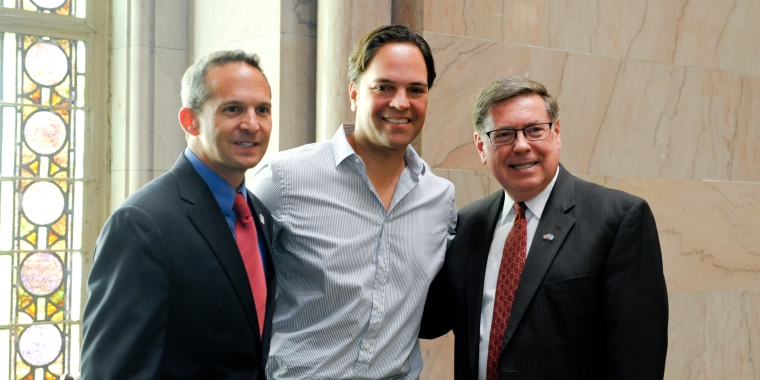
Senate: Drunken Drivers Who Kill To Be Charged With Murder
The New York State Senate today passed legislation (S.5517) that would create the new charge of aggravated vehicular homicide for drunken drivers who kill others.
Senator James L. Seward supported the measure.
"Drunken driving is bad; killing someone while driving drunk is worse yet and has lifetime consequences for the victim's family," Seward said.
Senate action on the legislation was announced at a Capitol news conference where senators were joined by the family members of Katie Flynn.
On July 2, 2005, the Flynn family was riding home from a family member’s wedding in Long Island in a limousine when they were hit head-on by 24-year-old Martin Heidgen, a drunken driver who was driving on the wrong side of the Meadowbrook Parkway in Long Island. The crash killed seven-year-old Katie and 59-year-old limo driver Stanley Rabinowitz.
"When you drive a car drunk, that car becomes a weapon that can kill. People are getting killed on the roadways of New York State and the people driving those cars should be charged appropriately," said Senator Seward. "I want to ensure that our laws give prosecutors the tools they need to go after those individuals who chose to drink and drive."
"When people make the decision to drink and drive, they are knowingly putting the lives of innocent people at risk," said Senator Bruno. "We have consistently sent a strong message that we will not tolerate drivers who endanger others because they make the wrong choice to drink and get behind the wheel of a vehicle. What happened to Katie Flynn and Stanley Rabinowitz was murder, and the drunk driver was rightfully convicted of that. This bill will give law enforcement the resources they need to make sure they can appropriately punish all drunk drivers who recklessly put the lives of others at risk."
"Drunk driving is at epidemic levels right now. Parents need to take the responsibility to teach their children it is not okay to drink and drive and everyone should know that if they drink and drive, they have to pay the price," said Joyce Rabinowitz,wife of the late Stanley Rabinowitz. "It is all about choices and planning. When you drink, you need to have a plan for how you are going to get home. Stanley and Katie would have been alive today if Martin Heidgen had made the right choice and planned how he was going to get home from that party."
The bill would strengthen state law by creating the new crime of aggravated vehicular homicide, a class B felony with a penalty of up to 25 years in prison. This crime would apply to criminals who kill someone in a drunk or drugged driving crash and also have at least one of the following:
> BAC of .18 or higher;
> prior DWI conviction within the last 10 years;
> crash caused the death of more than one person;
> crash killed one person and severely injures another;
> offender was driving with a suspended or revoked license from any state.
The legislation also creates the new crime of aggravated vehicular assault, a class C felony with a penalty of up to 15 years in prison. This crime would apply to drunk or drugged drivers who cause serious physical injury to another person and also have at least one of the following:
> BAC of .18 or higher;
> prior DWI conviction within the last 10 years;
> crash caused serious injury to more than one person;
> offender was driving with a suspended or revoked license from any state.
"Martin Heidgen killed two people and was convicted of murder. We need to strengthen the current law to make sure that prosecutors can apply that standard to anyone who recklessly drives drunk and takes someone’s life," Senator Fuschillo said.
In addition, the senate today passed two DWI bills would:
> increase penalties for criminal convictions of drunk or drugged driving where a child, under the age of 17, is a passenger (S.5315); and
> expand and strengthen New York State’s ignition interlock program for DWI offenders (S.5780).
The bills were sent to the Assembly.
The senate is expected to act in the near future on legislation that would:
> allow AMTs and EMTs to draw blood from a suspected drunk driver without a physician being present (S.5974), and
> establish a 24/7 sobriety pilot program in ten counties (S.4304-B)



